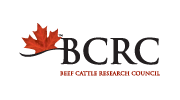Developing a tool to better predict carcass yield
| Project Code: | BQU.08.17 |
| Completed: | In Progress. Results expected in March 2023. |
Project Title:
Development of yield prediction tools to optimize carcass cut-out value
Researchers:
Oscar Lopez-Campos Ph.D. Oscar.LopezCampos@AGR.GC.CA
Oscar Lopez-Campos Ph.D., Jennifer Aalhus Ph.D., Nuria Prieto Ph.D. and Manuel Juarez Ph.D. (Agriculture Agri-Food Canada Lacombe); Mark Klassen (Canadian Cattlemen's Association)
Background:
Canada’s beef yield grades estimate the percentage of red meat in the overall beef carcass based on fat depth and ribeye size measurements between the 12th and 13th ribs. Periodically updating these yield grade equations to reflect changes in breed types, carcass weight, etc. has been very costly, as it requires detailed carcass dissections on very large numbers of animals. New Dual X-Ray Absorptiometry (DEXA) technology allows carcass composition to be estimated very precisely in a research environment, potentially allowing beef yield equations to be updated more economically and more frequently. At the same time, commercial carcass-based carcass grading technologies collect many more measurements than the simple ribeye size and fat depth measurements used by current yield grades. Beef cattle are generally thought to be reasonably consistent with respect to how lean meat is distributed around the carcass, but small variations may exist. The measurements that these camera-based technologies can record (carcass width, length, shape, etc.) may be able to identify carcasses that have a marginally higher percentage of retail meat in more valuable cuts (e.g. loin) or a slightly lower percentage of meat in less valuable cuts (e.g. chuck) than other carcasses. This, in turn, would impact the relative value of these fabricated carcasses to the packer, and could be provide valuable information back to seedstock breeders and cattle feeders.
Objectives:
Develop improved algorithms to predict lean meat yield and integrate them into existing computer-based technologies. Researchers will also benchmark total lean, USDA 5 yield classes and wholesale boxed beef yield variation within the Canadian cattle populations and establish guidelines for future targets.
What They Will Do:
Initially, carcass lean meat percentage, USDA retail yield, and Canadian (1993) retail percentage will be estimated for commercial beef carcasses using the whole carcass camera (commercial packing plant) and ribeye CVS camera (research abattoir). The carcasses will be fabricated to commercial specifications, and the camera and carcass data will be used to develop a “wholesale boxed beef yield” prediction equation. The prediction will be strengthened with more data from 700 research cattle processed at AAFC Lacombe. The updated equations will be incorporated into the CCA’s “Carcass Information System” and tested in a commercial packing plant.
Following this, carcasses from a commercial packing plant and AAFC Lacombe will be fabricated in two ways. One carcass side will be subjected to an industry standard cutout. The other side will be fabricated in a manner that optimizes boxed beef cutout value based on the new prediction equations. Following this, each primal, wholesale and retail cut from each carcass side will be scanned with the DEXA machine, then fully dissected into fat, lean and bone. The lean will be DEXA scanned again to determine intramuscular fat (marbling) content.
Implications:
This project will develop cost-effective approaches to individually fabricate beef carcasses to optimize cut-out value and better meet the demands of Canada’s domestic and international beef markets in a commercially practical manner that minimizes unnecessary labor costs.








